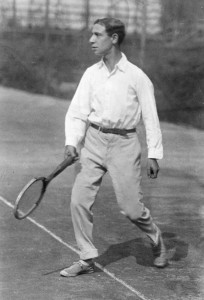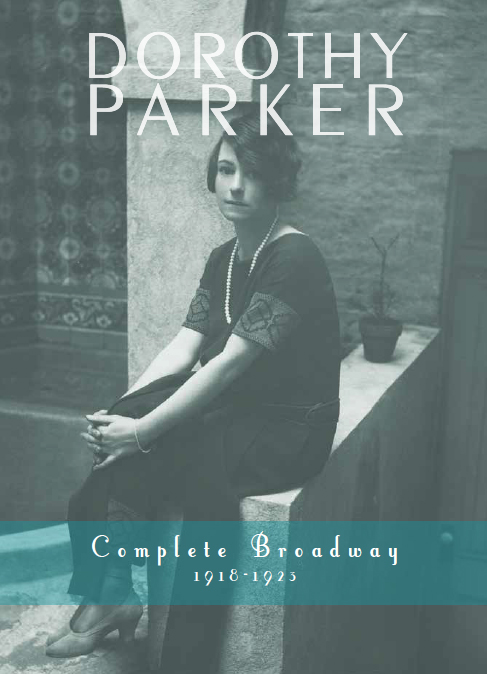April is National Poetry Month. This is a good time to remember the poets who were members of the Vicious Circle: Franklin P. Adams, Dorothy Parker, and John V.A. Weaver. I thought about adding Frank Sullivan to the list, since he wrote the Christmas Letter in The New Yorker for so many decades, but decided against it. If you disagree with my decision, tell me on Twitter.
Here are my three Algonquin Round Table members for National Poetry Month:

Franklin P. Adams
A Tennis Player’s Garden of Verses
How do you like to get out on a court,
Out in the August sun?
Oh, I think that is the pleasantest sport
Ever a boy has done.
Every night I say a prayer
That I shall be a better player;
And every day it’s not too wet
I knock the balls across the net.
The child who has a little nerve
Will have a fairly decent serve;
He’ll win a match, I’m pretty sure,
Unless his forehand drive is poor.
A birdie who observed me play
Stopped a minute just to say,
As I sent a service out,
“Ain’t you ‘shamed, you clumsy lout?”
The world is so full of a number of parks.
I’m sure we should all be as happy as larks.
The friendly court all green and white
I love with all my heart;
I hit the ball with all my might,
But precious little art.
Franklin P. Adams
A Wish
I do not yearn for prairies wide;
I crave to tramp no tangled wood;
I hunger for no hills. I tried…
It did no good.
And yet I wish I wished to roam;
I wish I craved the open sea;
Or loved the meadow for my home,
The life that’s free.
I wish I craved to see the corn,
Or ached to glimpse some native spot;
And yet to be where I was born
I hanker not.
I wished I yearned to see the hut
Of boyhood, if for but a minute.
Not that I like this wishing, but
There’s money in it.
When we think of poets at the Algonquin Round Table, no name is bigger than Dorothy Parker. She went into the National Academy of Arts and Letters, as well as the New York State Writers Hall of Fame, largely on the strength of her verse. I like this gem:
Spring Song
(In The Expected Manner)
by Dorothy Parker
Enter April, laughingly,
Blossoms in her tumbled hair,
High of heart, and fancy-free—
When was maiden half so fair?
Bright her eyes with easy tears,
Wanton-sweet, her smiles for men.
“Winter’s gone,” she cries, “and here’s
Spring again.”
When we loved, ‘twas April, too;
Madcap April—urged us on.
Just as she did, so did you—
Sighed, and smiled, and then there were gone.
How she plied her pretty arts,
How she laughed and sparkled then!
April, make love in our hearts
Spring again!
When I was editing The Algonquin Round Table New York: A Historical Guide, I was happy to include one poem by John V.A. Weaver. His books are out of print, but if you can find In American, you’ll thank me. Weaver was called a “slang poet” for writing free verse. He’s largely forgotten today, but was extremely popular in the 1920s and 1930s. This is also from The Lost Algonquin Round Table: Humor, Fiction, Journalism, Criticism and Poetry From America’s Most Famous Literary Circle. It’s from 1922.
Bootleg
By John V.A. Weaver
(With a graceful bow to Don Marquis)
You heard me! How many times I got to tell you?
Them is my words: you leave that girl alone.
Leave her alone, you hear? Leave her alone!
You think I’ll have my son foolin’ around
A little snippy rat that’s all stuck-up,
And thinks my son’s not good enough for her?
“Yeh,” that’s what Bill says, “Yeh, it’s like I say;
Ellen is got swell friends up on the Drive;
I’m sorry she had to break a date with Fred.
But still, you know, the world is changed a lot,
And we changed with it. You’re about the same,
But me—well, I been gettin’ right along,
And honest, Jack, you see the sense yourself—
Why should I let my daughter marry a clerk?”
Can you believe it? Why, I damn near fainted.
His daughter too good for the likes of us!
Of course I got so mad I couldn’t see!
Of course I pasted him square in the eye!
And if I catch him sayin’ things about me
I’ll knock his stuck-up head off! And I tell you,
If you go near the dirty oilcan’s place,
And crawl around that snippy brat of his,
I’ll kick you out into the street to stay.
You hear that? Eight out in the street you go!
The nerve! The dirty, lousy, low-down crook!
A Bootleg gettin’ stuck-up over money!
The world is crazy, that’s all there is to it!
Crazy, I tell you! All turned upside-down!
Listen. It’s fifteen years I know this Bill.
Them good old days, most every afternoon
On the way home from the lumber yards I’d drop in
And get a beer, and gas around a while.
That was my second home, I useta say,
And Bill’s Place was a home you could be proud of.
Say. The old woman never kep’ a floor
As clean as Bill’s was. And the brass spittoons
And rail-you could of shaved lookin’ in one.
And all the glasses polished! And the tables
So neat! And over at the free-lunch counter,
Charlie the coon with a apron white like chalk,
Dishin’ out hot-dogs, and them Boston Beans,
And Sad’dy nights a great big hot roast ham,
Or roast beef simply yellin’ to be et,
And washed down with a seidel of old Schlitz!
Oh, say, that sure was fun, and don’t forget it.
Old Ed, and Tom, and Baldy Frank McGee,
And the two Bentleys, we was all the reg’lars.
It was our meetin’-place. And there we stood,
And Lord! The rows about the government,
And arguin! and all about the country,
How it was goin’ to the dogs. And maybe
Somebody’d start a song, and old Pop Dikes
Would have to quit the checker-game in the corner
That him and Fat Connell was always playin’,
And never gettin’ through. I never seen
No bums come in and stay for more’n a minute;
Bill didn’t like to have no drunks around;
He made ’em hit the air. Well, some of us,
Of course, might get just a wee mite too much
Under the belt, but who did that ever hurt?
At least we knowed the licker wasn’t poison.
And when somebody would get very lit
Bill was right there to try and make him stop;
I can’t see how it ever hurt us any.
And Bill! He was some barkeep! One swell guy!
A pleasant word for everybody, always,
Straight as a string, and just the whole world’s friend.
I never saw a guy was liked so much.
He hardly took a drink, just a cigar,
And oncet a while a pony, say, of lager.
And my, the way that bird could tell a story!
Why, many a time I laughed until I cried.
And if it happened I was out of dough,
Bill was right there to make a little loan.
Generous, that was Bill, and one good pal.
A great old place it was, that place of Bill’s.
Them was the happy days!-them was the days.
I never will forget that good-bye party
The night that Prohibition was wished on us.
You bet it wasn’t any rough-house then.
We all stood ’round the bar, solemn and quiet,
And couldn’t hardly think of what to say.
Bill—it was funny what had happened to him.
He didn’t crack a smile the whole blame night.
He just would shake his head, and bite his lips,
And gosh, the way his eyes was shootin’ fire.
The last thing that he said before I left,
“By God, I’ll get back at ’em, you just wait!
I’m closing here. But don’t you fret—I’ll get ’em—
The dirty, pussy-footin’ lousy skunks!”
I had to go home early. And the next day
I seen the wagons comin’ to take the bar
And all the furniture. I felt like cryin’.
Well, you know what this prohibition is.
Bill goes away, and stays about three months.
And then one day I meets him on the street.
“Well, Jack,” he says, You want some real good gin?”
“Just what I need,” I says. “All right,” he says,
“You come down to the house at nine o’clock.
I’ll fix you up. I’ll give you half a case
Four Bucks a bottle.”… “Four a bottle!” I says,
Thinkin’ he must be kiddin’. “Sure,” he says,
“I got to make my profit. There’s the risk.
This is good stuff. I made it by myself.
I guarantee that it won’t make you sick.”
“I’m sick already, just from hearin’ the price.
No thanks. Not now,” I says. He says all right,
But when I want some, just remember him.
And so, of course, later I did want some,
And had to pay that much, and even more;
But hell, what can you do? So long’s you’re sure
The stuff ain’t goin’ to burn your insides out,
You got to pay the price. And all the friends
That Bill had useta have is customers,
And all get stung the same. And dozens more.
Them old days Bill was one fine friend for sure,
Happy and nice and straight and generous.
And now to think he high-brows you and me!
A great big house he’s got, and a new Packard,
And di’monds for his wife, that scrubbed the floors
Back in the days when he was only barkeep.
That’s what this Prohibition done for him,
And what’s it do for me, I’d like to know?
It makes a crook of me, the same as him,
Only I’m losin’ money, and he gets it.
Why, say, I catch myself all of the time
Laughin’ about this Prohibition law,
And figgerin’ new ways how I could break it.
And that’s the way it is with everybody.
We get to see that one law is a joke,
And think it’s smart to bust it all to pieces.
And pretty soon there’s all the other laws,
And how’re you goin’ to keep from think’ likewise
About a thing like stealin’, and all that?
No wonder that we got these here now crime waves!
No wonder everybody is a crook!
But that ain’t what I’m sayin’ to you now!
You leave that stuck-up little Jane alone!
They’s plenty of girls that’s pretty in the world—
You leave that dirty oilcan’s daughter be.
Ten years ago she used to run around
And rush the can for me and other folks.
Now she’s a real swell lady! Damn her eyes,
And Bill’s, and them there pussy-footin’ fish!
The world is, crazy! And I’m goin’ nuts!
High-tonin’ me! You hear me? If I catch you
Foolin’ around that girl, I kick you out,
So fast you won’t know what has ever hit you!
A bootleg’s daughter! Hell!
***
Join me April 16 at 6:30 PM at the Mid-Manhattan Branch of the New York Public Library for a free talk about the Algonquin Round Table.

